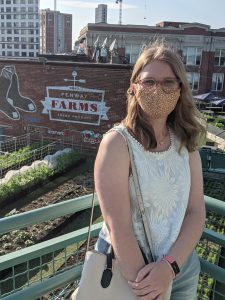What did you accomplish with your host organization? What was the impact of your work?
My work this summer with the Inland Ocean Coalition (IOC) focused on developing their Ocean-Friendly Farming (OFF) campaign. I was fortunate to have a lead role in designing the entire campaign, from its mission and priorities to its future impact goals. The initial piece of the campaign was creating a list of Ocean-Friendly Land Practices that highlight conservation and regenerative farming practices that have a positive benefit on watershed or ocean health. After developing the list, my team and I created the values and objectives platform to build the campaign’s future advocacy and educational projects. We then reached out to farmers from multiple states to give constructive criticism on the campaign. These farmers are the first members of our developing Ocean-Friendly Farming community, which endorses farmers across the nation who practice Ocean-Friendly Land Practices.
Beyond the lead role I had in creating the campaign, I also took on work to endorse the project across the US. This November, an article I wrote about OFF will appear in a regenerative agriculture journal called Mad Agriculture. My article will widen our outreach efforts to make the campaign a national educational tool and platform, helping to connect farmers to the world of ocean policy and concerns.
This project and other content I assisted on expanded IOC’s educational and campaign scope and will further its advocacy impact across the nation once OFF gains national momentum.
Describe the benefits of this experience for you professionally and personally?
There were many benefits to the work I did with IOC this summer. Professionally, I developed new skills in WordPress and Articulate 360 and gained new experiences in team and project leading, meeting facilitation, communication, and research. I also gained insight into the relationship between land practices and ocean health through research and interviews with regenerative farmers. Despite the scientifically proven connection between farming practices and ocean health, I learned that a lot of work needs to be done to connect inland producers’ concerns and coastal protection and management.
Beyond my professional experience with them, there were several personal benefits to working with IOC. At IOC, I found a fun, caring, passionate, and enjoyable work atmosphere that taught me that who you work with is just as important as the projects you work on. Because of them, I know what type of employer I should look for amongst the organizations I’d like to be a part of. I also learned that I’d like to extend my passion for ocean protection beyond my professional career. I plan to do that by dedicating time to volunteering within grassroots efforts and creating an ocean movement in my future community, whether I live in a coastal community or inland.
Did your experience provide any unexpected discovery, self-reflection, or epiphany?
Before June 2020, I would have described myself as indifferent to the operations within the food production system. I was very aware that the system needed to change because of its significant consumption of natural resources, its release of chemical pollutants, and economic and social challenges. However, because of this fellowship experience, I’ve become invested in the future of farming practices. I’m now exploring the Great Plain’s agricultural practices and agriculture-caused coastal eutrophication in the Gulf of Mexico as a part of my studies at MIIS.
I’m unsure where my next professional experiences will take me, but I am now considering a future where I work at the intersection of ocean and agricultural policy. Specifically, working to connect investments in soil health to ocean health.



